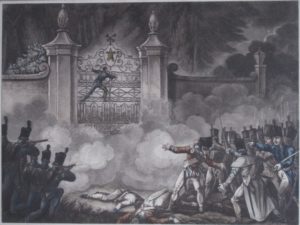Siege of Badajoz

1812
The siege of Badajoz was one of the most formidable operations in the history of warfare!
By their action in the capture of Badajoz, one of the most formidable fortresses in Europe, The 74th ensured that British communication and supplies continued into Spain during the Peninsular War.
This seemingly impossible task succeeded when following days of unsuccessful attempts taking the castle, The 74th succeeded in scaling the walls and opening the way for others to enter the city. The vicious fighting against the French broke into the Spanish city and after capturing the castle, the town soon fell to British control and Wellington was in total control by the morning.
Badajoz dominates the Spanish/Portuguese border on the main highway between Spain and Lisbon. It had to be captured before the liberating British Army could enter Spain, otherwise the French could have cut British lines of supplies and communicationsth at will. Nor could Portugal be considered secure as long as Badajoz remained in French hands.
It had never been captured by force although it had fallen in the past as a result of treachery and weakness.
Thus, Wellington laid siege to Badajoz in the Spring of 1812. Badajoz was well defended. Its complex fortifications, including walls, ditches and a river, were in good order and it contained a strong garrison, utterly confident of their ability to hold the place, which comprised a heavily fortified town, dominated by a castle. Time was short as French forces in superior numbers were hurrying to the relief, so Wellington had to act quickly. Accordingly, he gave the order to assault at the earliest possible moment, although his artillery had barely made adequate breaches in the walls.
The main attack was on the town and was undertaken by The Light and The 4th Divisions, with a diversionary attack on the castle, by The 3rd Division, which included The 74th Highlanders.
At night and under fire, the attacking Regiments crossed the river and assaulted Badajoz. Despite the utmost gallantry in the three separate attempts, he Light and 4th Divisions and losing 4,000 men in the breaches, the main attack did not succeed. Wellington, about to acknowledge failure, asked for a final effort from the 3rd Division, whose attack had been merely intended as a ruse to draw defenders away from the main effort. Spurred on, they climbed the heights below the castle walls and hoisted up their scaling ladders, but as the assault parties neared the top, these were repeatedly thrown down and the soldiers toppled into the river.
At last, just as failure seemed inevitable, one party succeeded in scaling the walls and others followed, including The 74th , and after bitter fighting the French garrison was forced from the castle into the town. With the castle in British hands the fall of the town was, more or less, inevitable. So Wellington’s luck had held once more and he rode into Badajoz the following morning.
In a letter to Lord Liverpool, written the following day, Wellington confided:
“The storming of Badajoz affords as strong an instance of the gallantry of our troops as has ever been displayed. But I greatly hope that I shall never again be the instrument of putting them to such a test as that to which they were put last night.”
The capture of Badajoz ranks as one of the most formidable operations in the history of warfare and no Regiment contributed more to this achievement than The 74th Highlanders.
Badajoz is one of the Regiment’s battle honours.
